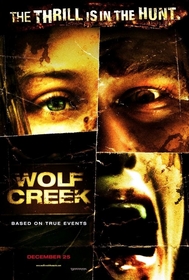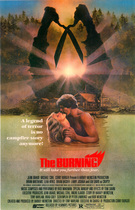Our editor-in-chief Nate Yapp is proud to have contributed to the new book Hidden Horror: A Celebration of 101 Underrated and Overlooked Fright Flicks, edited by Aaron Christensen. Another contributors include Anthony Timpone, B.J. Colangelo, Dave Alexander, Classic-Horror.com's own Robert C. Ring and John W. Bowen. Pick up a copy today from Amazon.com!
Wolf Creek (2005)
I have to admit this: I don't get out much, and when I do, I rarely visit local theaters.
Having confessed that, I viewed Wolf Creek in a Ft. Lauderdale theater during a recent excursion to Florida. My viewing was a treat, especially since I experienced firsthand how horror films genuinely scare others: I can still hear the visceral screams from three different women in the audience. Having viewed so many horror flicks, I sometimes, regrettably, forget this aspect of the genre. I also was impressed at how prolific and popular the genre has become: most of the films on the venue had a horror slant to them, and during the previews to Wolf Creek, no other genre was spotlighted.
The story here is simple. Three attractive, college-aged adventurers (one male, two female) travel to Australia to hike and explore the exquisite Wolf Creek National Park in the Australian Outback. They experience some predictable challenges during their journey, including a brief run-in with some of the grimy, Crocodile Dundee-like locals, and a budding, superficial romance between two of them develops. Upon their arrival at the park, more obstacles emerge, but a friendly denizen of this barren landscape offers a much-needed helping hand. The bushman, named Mick Taylor, tows their broken-down vehicle to his home, but during their time at Taylor's camp, their trip quickly turns hellish.
Simple? Predictable? Yep, absolutely, and subsequently, the film suffers. This narrative has been told too many times before to work much longer without a major twist. During the first 45 minutes, I wasn't sure if I was watching a horror film or some teenage angst flick flickering in the shadows of a James Dean Fan Club meeting. Wolf Creek simply takes too long to raise hell. I also caught myself thinking too often of other horror films than the one unfolding before my eyes (Wasn't that in The Hills Have Eyes? Was that a reference to The Texas Chain Saw Massacre? Is this the Aussie version of Cabin Fever?). Distracting? Yes. An effective homage? No, that wasn't the point at all.
Having twiddled my thumbs through the first hour, my reaction to the character development was equally harsh. The least the filmmakers could have done was develop intriguing people. We learn very little about these bohemian travelers except that they like to party. I wanted more so I could like them more. However, their lack of depth places more importance on the depravity that erupts in the film's second half. During the more grotesque, sadistic scenes, I feel for them not because of who they are but because of what happens to them. If these sympathies surfaced earlier, in a perverse way, my sense of horror, shock, and awe might be more directed at them than at the despicable actions perpetrated against them. Eventually, I just accepted Wolf Creek's conventional character development because it is common for such hellraisers. At the very least, the impersonal nature of the horror complemented the impersonality I felt for the characters.
Notwithstanding the predictability that haunts Wolf Creek, the film barely saves face for one simple reason: the narrative is based on a true story. Wolf Creek is based on the Australian backpack murderer Ivan Milat, who in the early 1990s killed at least seven backpackers in New South Wales. All but one of his victims was in the 19- to 21-year-old age range, and most of the victims were foreign travelers. In 1996, Milat received seven life sentences for his crimes.
These events did happen, and the film notes this at its beginning. An opening intertitle reminds viewers that 30,000 people in Australia are reported missing every year; only a small percentage is ever found. The film cleverly forgets to echo this important fact until the end when it forces viewers to question these two unnerving questions: What happens to all those missing people who are never found? And what happens to all those murderers who are never apprehended? These are questions every nation and its law enforcement officials shirk because they inevitably reveal two profoundly disturbing facts: statistically speaking, traditional state-supported justice systems are failing miserably in preventing crime and in catching the criminals who perpetrate those crimes. Wolf Creek works in making us reflect on these questions but fails by inadequately answering them: in the film, these "missing people" are eventually found, and in reality, Milat was imprisoned.
The film deservedly received criticism for creating the perception that it is "based on a true story". The film does pull facts from the Milat case, but much of the film, most notably the ending, detracts significantly from reality. Milat was busted and is rotting in jail. The film paints a very different picture and suggests that to a certain degree the Outback is running amok with demons like Milat. Such fear mongering and sensationalism is disingenuous for a film claiming to be "based on a true story".
The film redeems some of its flaws because of the exquisite cinematography of the Outback. Director Greg McLean wisely portrays the Australian wilderness itself as a cool, lonesome killer. As the film progresses, the barren landscapes generate a sense of brooding that complements the action nicely.
If you know your horror, this one barely works because it fails to distinguish itself in any meaningful way. If you're looking for brainless sadism, this is your film, but if you want a unique narrative with well-developed characters couched in a sadistic drama, delete this one from your queue. Filmmakers should not be criticized for towing the party line, but when they do, they don't deserve commendation either. Placing an old, hackneyed script in a new continent is simply not enough. Sure, the cultural glimpses into some restricted slices of Australian life are occasionally interesting, but not enough so to save the film.
Ultimately, Wolf Creek is confused about its fundamental message. Beyond raising a few poignant questions (I'm being generous), Wolf Creek is just another run-of-the mill psycho-killer narrative that confidently tries to dazzle viewers with its "realism" when in fact it fizzles due to its mediocre story.









Have to respectfully
Have to respectfully disagree. In four and a half decades, I've seen many, many shockers, and this one really jolted me, as well as leaving me feeling very sympathetic towards the victims. Very savage and effectively scary, in my opinion.
As for the "this is based on true events" message, I didn't find it disingenuous or unproductive scaremongering. I think it's a sobering fact that I'll personally take into consideration when I visit Oz.
I do enjoy this website though. Thanks!
Great review! I agree
Great review! I agree completely. I was excited to see this because it had good word of mouth and critics loved it. All I got was a generic slice'n'dice film with boring characters, a lousy script and a "business as usual" feel to it.